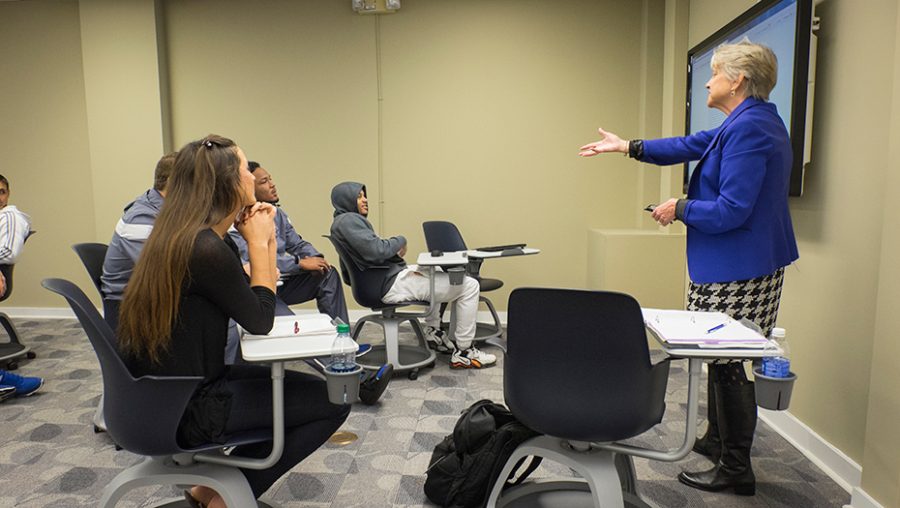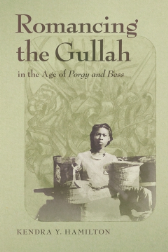Dr. Anita Gustafson Reflects on 19 Years at Presbyterian College
May 31, 2016
As recent Presbyterian College graduates prepare to take their next steps, so does long-time history professor Dr. Anita Gustafson, who has accepted a new position as the Dean of Liberal Arts at Mercer University in Macon, Ga. While this is an exciting step for her, she will be sorely missed by the PC family. Before she left, I was fortunate enough to get an interview with her about her nearly 20-year career at PC. As Gustafson has said, “It’s important that when opportunities come your way you completely search them out.” The Mercer community will be gaining an amazing member to their college family. And we, as her PC family, wish her all the best on her new adventures as she strides ahead to take on this opportunity.
KELLY CICHON: So, you’ll be the dean of the liberal arts college?
ANITA GUSTAFSON: Yeah, the position is called the Dean of the College of Liberal Arts at Mercer University.
KC: What’s going to be the biggest thing you’ll miss about teaching history?
AG: Well, I won’t be teaching as much, so I’ll be missing the teaching part of it and I think, when you go and have an academic career, and you have administrative experience, there’s always that pull into the classroom. And unfortunately it’s hard to balance those. It’s almost like you need to be the teacher full time or the administrator full time. Now, I will have the opportunity to teach, but I probably won’t do it my first year because I’ll have a lot to learn in my new position. So I will look forward to teaching again and I may end up teaching history there later in my career because they do, when you come into this kind of position, you’re offered tenure in your home departments so I will be a tenured member of the history department as a result of this, too. So I’ll be working with a new department, you know I will very much miss the folks I work with here because I just think they’re a great group of colleagues. It’s just really hard to match this history department, let’s put it that way.
And I’ll miss the daily interaction with the students. I think that’s the thing. I’ll certainly have student interactions, but I’ll have to really make an effort to find those connections, whereas when you teach they come more naturally. You interact with students all the time. So that’s going to be the thing I miss the most.
KC: Now, you’ve been here at PC since…?
AG: Since 1997.
KC: What would you say then are the biggest changes you’ve seen here since you started teaching?
AG: Well there’s been a whole transition in the faculty, because when I started I worked with a group of men who had been here for over 30 years, right, so they were hired when I was a child, and so then when I came in there was, I was in this sort of beginning of a wave of new faculty that came in. So I would say from a faculty perspective there are more women, there are more children of faculty members, there’s a more family attitude, especially if you are a mother or a father. You know, it allows for those more family connections to happen. I had my son very soon after I was hired and there were not pregnant faculty members, you know, there hadn’t been one since I don’t even know when, so having a more family oriented faculty I think is great. And not to say that the previous faculty wasn’t family-oriented, but it’s a different generation in terms of how people parent. It was more men who probably didn’t parent as much as the men that I work with now. So I’d say that’s different.
Another huge thing that’s changed is the use of technology, you know the cell phones and the texting. That has changed so that after class students put their head in the phone, where it used to be that you’d stop and say hi, chat a little. Technology has really added a lot to our lives, but it’s something I miss from when there wasn’t the technology that you had to kind of fight all the time in and out of the classroom. So that’s a big change.
I think the way we teach has changed as well. We’ve become more interactive in our teaching styles as a whole, so I think that’s changed. I think the students have changed. I think that you all are kind of growing up in a more diverse world, and that diversity is something you expect. I mean that in every sense of the word, diversity. I think that you all are much more accepting than you were 20 years ago, you know, than the students were when I started. So I think that there’s a difference there. I don’t know, those are the differences that come to mind. But we’ve expanded the athletics, we’ve got new faculty, and we’ve built new buildings; Springs has been redone, we got the new football stadium, Lassiter Hall, the library renovation, so I think those are all really positive changes. And hopefully the Neville renovation soon!
KC: Hopefully! So what are you going to miss most about PC as a whole?
AG: I will miss, definitely, the people. So the students, my colleagues, Clinton–you know even though it’s a small town and people think, “Oh my gosh,” but we have deep roots here. My family is very connected in the schools and the church that we go to, so that’s the hardest thing of saying goodbye, you know, saying goodbye to people who have been a part of our lives for a long time.
KC: So, on the flip side, what are you most excited about, about going to Mercer?
AG: I’m excited about the new opportunity, and I’m excited about being in a leadership position. I feel as if I’ve had really good leadership opportunities here that have prepared me to step into this role. I think it’s important that when opportunities come your way that you completely search them out, and that’s what I tell my students to do, especially when they’re freshmen. I want you all to find the best thing for you and to search out opportunities, so I kind of decided maybe I needed to do that, too. And this was a position that someone nominated me for, so I just started exploring it. You start looking at it more and more and you’re thinking, “Well, I think this is the time in my career for me to try something new,” and that doesn’t come around every day. So I’m looking forward to the new challenges and learning in a new venue. I think I can learn a lot about leadership and take what I learned here, but also learn more about how that institution operates. And they’ve been very welcoming, so that’s nice!
KC: Now, is Mercer a bigger school?
AG: It is, the college of liberal arts has 1500 students, maybe a little more. I say that because I’ve read different things. And it’s a university, so there are different colleges that I’ll be working with. The College of Liberal Arts is like the PC in the middle of that university; you know, it’s got your traditional liberal arts focus, but they’ve got a school of business, a school of music, education, law–a lot of our PC students have gone to law school there–school of medicine, pharmacy, nursing, and a few others. But the job that I have will be working with the College of Liberal Arts, and that’s their traditional undergraduate program.
KC: So with PC being a small school and Mercer being significantly bigger…
AG: For one thing, I like that I’ll be learning how larger institutes operate. I think that the job I’ll be doing as the Dean of Liberal Arts will be very similar to the job as provost here. In other words, that part of it is not going to be so different from PC. They’ve got the same general education, the same classes, a little more faculty, but it’s really not that different. And I think my PC experience helped me so much, because they value the liberal arts education there exactly like they do here. That was very evident as I interviewed, that they wanted someone that had spent her career in a liberal arts institution. So that part I think is really going to be very similar. I think the main difference is that I’ll be working with other deans of different entities of the college. So I’ll be working with those deans of the other programs, law, medicine, engineering, etc. Most of my job, though, will be working in familiar territory.
KC: So, do you have any words you want to leave for your students and the incoming students?
AG: Well, I do want to make sure that people know I will always bleed blue. I love this place, and I will always feel connected to Presbyterian College. I’ll probably start crying if I think about this too much. I will always feel connected here, I absolutely believe in the education that takes place here and so I’m strongly excited when I hear about students that are coming here next year. Because I know they’re going to have a great experience here, and that’s why I was here for as long as I was. So I’m kind of taking that experience elsewhere, but I think that’s what our students do, too. You know, you come here, you learn as much as you can, and you grow as a person and into an adult, and then you graduate, so I see that as a parallel experience. So my words would just be encouragement and excitement to look forward to the growth of PC.





